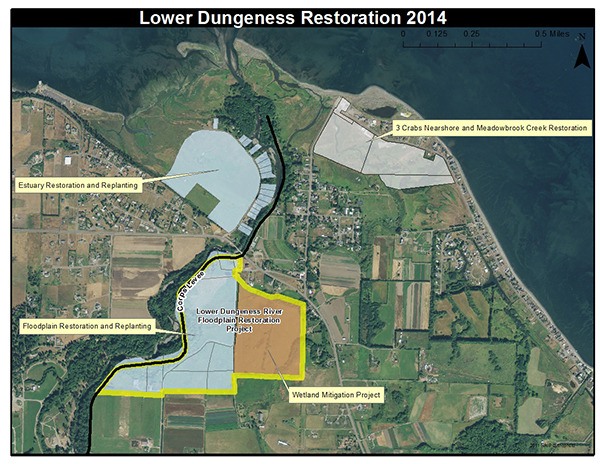Efforts at the Dungeness River watershed to reduce flood risk, conserve water and restore habitat will push forward into next year after receiving $7.5 million in state funding through the Floodplains By Design initiative.
The grant administered by Adam Sant for the Washington Department of Ecology allows for officials with the North Olympic Salmon Coalition, Jamestown S’Klallam Tribe, Clallam Conservation District, Clallam County and the North Olympic Lead Entity for Salmon to continue their collaborative work on the lower Dungeness restoration project.
“Amazing work” is getting done on the North Olympic Peninsula, Sant, a new project manager, said. “One of the highlights of my new position here at Ecology has been to work with and experience the dedication and passion of the people working in the lower Dungeness,” he said.
Divided among the various organizations, the grant will fund restoration at the former site of the Three Crabs Restaurant, design and engineer a portion of the levee, pipe irrigation ditches to prevent water loss, potential McDonald Creek restoration, replant and maintain lower Dungeness floodplains with native vegetation and purchase high quality salmon habitat.
Floodplains By Design was initiated by officials with the Nature Conservancy and partners to achieve diverse floodplain management and ecosystem recovery goals while ensuring public dollars are well spent, said Bob Carey from The Nature Conservancy. In total, Floodplains By Design, partners with The Nature Conservancy, Washington Department of Ecology and Puget Sound Partnership, successfully requested $33 million in funding from the Washington Legislature in the 2013-2015 biennium for multi-benefit projects to reduce flood risk, restore habitat and provide additional benefits to people, wildlife and agriculture.
With the help of all involved, the grant written and submitted by North Olympic Lead Entity for Salmon staff is the largest of nine grants awarded to individual projects.
“We are grateful for the recognition by the Washington state Legislature and the Nature Conservancy of the strong partnerships needed to advance large-scale restoration and their support of these multi-benefit projects,” Cheryl Baumann, Lead Entity for Salmon coordinator, said.



